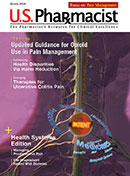The issue of COVID-19 vaccines in MS patients was raised at the recent Americas Committee for Treatment and Research in Multiple Sclerosis (ACTRIMS) annual meeting, Forum 2021, held virtually.
“With the rollout of vaccines to the SARS-CoV-2 virus (aka COVID vaccines) aimed at protecting from COVID complications and viral spread, important questions have been raised with respect to individuals living with MS and particularly those on different MS DMTs,” according to an abstract for a presentation by Amit Bar-Or, MD, of the Perelman School of Medicine at the University of Pennsylvania.
Dr. Bar-Or raises several questions, including whether there is likely to be a risk of immune activation with the mRNA vaccines given emergency-use authorization that might trigger MS relapse. Bar-Or also puts forth concerns about use of the vaccines on patients taking DMTs and whether the therapy could affect the effectiveness of responses to COVID-19 vaccines. He further mentions advice on timing of vaccines relative to administration of specific DMTs.
“While direct data is lacking, it is expected that different DMTs will have different impact on COVID vaccine responses, and that these differences will depend on the particular DMT mechanism of action and, when relevant, the timing of vaccination relative DMT administration,” Dr. Bar-Or notes.
The abstract points out that vaccine-induced neutralizing antibodies to the SARS-CoV-2 spike protein are probably important for effective protection, and goes on to explain, “Cell-depleting therapies, including those that deplete B-cells (egaCD20, cladribine, alemtuzumab) are likely not to impact pre-existing humoral immunity, but expected to attenuate vaccine induced antibody responses.”
In line with that. the National Multiple Sclerosis Society recently recommended dosing adaptations for some DMTs in an effort to improve novel coronavirus vaccine effectiveness.
At the time of release of guidance, two COVID-19 vaccines were being distributed in the United States—the Pfizer-BioNTech and the Moderna vaccines— both of which are mRNA-based and require two doses.
The MS Society says that, based on their mechanism of action, these vaccines are expected to be safe for MS patients, regardless of the use of DMTs, according to the National MS Society, which strongly urged vaccination.
It advises that patients about to start on Avonex, Betaseron, Copaxone, Extavia, glatiramer acetate, Glatopa, Plegridy, Rebif, Aubagio, Bafiertam, dimethyl fumarate, Tecfidera, Tysabri, and Vumerity should not delay initiation for a COVID-19 shot, and those already taking one of these DMTs will require no adjustments.
While, in many cases, getting the vaccine as soon as possible might be more important that timing it with a DMT, according to the MS Society, the group suggests that timing or adjustments might be desirable, if possible, for the following DMTs:
.
Gilenya, Mayzent, Zeposia: Patients about to start Gilenya, Mayzent, or Zeposia should consider getting the Pfizer BioNTech or Moderna COVID-19 vaccine so that the second vaccine injection is done 4 weeks or more prior to starting Gilenya, Mayzent, or Zeposia. Those already taking Gilenya, Mayzent, or Zeposia, should continue taking the medication as prescribed and get vaccinated as soon as the vaccine is available.
Lemtrada, Mavenclad: Those about to start Lemtrada or Mavenclad should consider getting the Pfizer BioNTech or Moderna COVID-19 vaccine so that the second vaccine injection is done 4 weeks or more prior to starting Lemtrada or Mavenclad. Those already taking Lemtrada or Mavenclad should consider having vaccine injections starting 12 weeks or more after the last Lemtrada or Mavenclad dose, with the optimal timing of the vaccine 24 weeks or more after the last DMT dose. When possible, Lemtrada or Mavenclad should be resumed 4 weeks or more following the second vaccine injection.
Ocrevus, Rituxan (and biosimilars): Patients about to start Ocrevus or Rituxan should consider getting the Pfizer BioNTech or Moderna COVID-19 vaccine so that the second vaccine injection is 4 weeks or more prior to starting Ocrevus or Rituxan. Patients already taking Ocrevus or Rituxan should consider getting the vaccine injections 12 weeks or more after the last DMT dose. When possible, Ocrevus or Rituxan should be resumed 4 weeks or more following the second vaccine injection.
Kesimpta: Patients about to initiate this DMT should consider getting the Pfizer BioNTech or Moderna COVID-19 vaccine so that the second vaccine injection is 4 weeks or more prior to starting. Those already taking Kesimpta should consider getting the vaccine injections 4 weeks after their last Kesimpta injection. When possible, Kesimpta injections should be resumed 4 weeks or more following the second vaccine injection.
High-dose steroids: Patients on this therapy should consider getting the vaccine injections 3 to 5 days after the last dose of steroids.
“The science has shown us that the COVID-19 vaccines are safe and effective. Like other medical decisions, the decision to get a vaccine is best made in partnership with your healthcare provider,” guidance from the society states. “Most people with relapsing and progressive forms of MS should be vaccinated. The risks of COVID-19 disease outweigh any potential risks from the vaccine.”
It also especially encourages high-risk patients to be vaccinated as soon as possible, including those with progressive MS, those who are older, those who have a higher level of physical disability, those with certain medical conditions (e.g., diabetes, high blood pressure, obesity, heart and lung disease, pregnancy), and Black and Hispanic populations.
The content contained in this article is for informational purposes only. The content is not intended to be a substitute for professional advice. Reliance on any information provided in this article is solely at your own risk.
« Click here to return to Weekly News Update.






